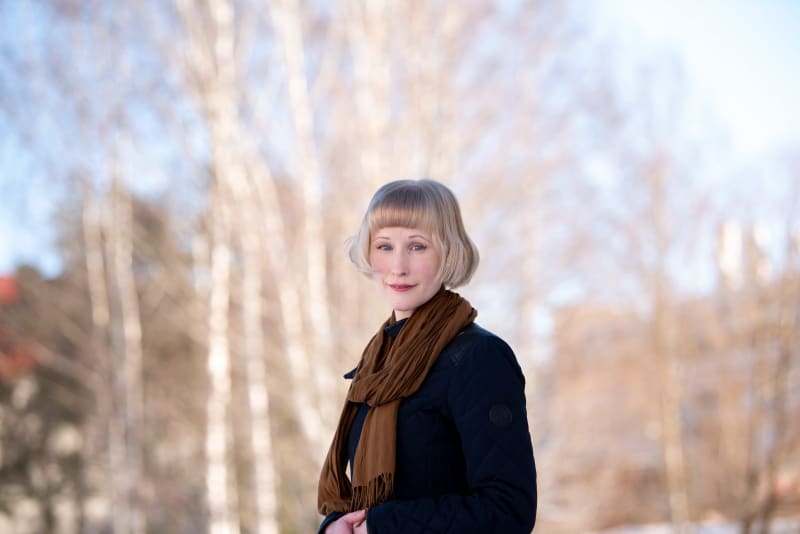Turku writer Iida Rauma has won the Finlandia prize for fiction with her novel Hävitys. The victory novel is a merciless description of school violence.

– This is a book that asks why injustice against a child is nobody’s business. The book reminds us how everything would be different if there was someone who would just listen and believe.
is Iida Rauma’s third novel and also the most difficult and personal. He says that if the book had failed, he would probably be looking for other jobs right now.
– I couldn’t believe it when Antti told me that my book had won Finlandia. I was just about to swallow my disappointment, Rauma says.
The feeling of happiness is now the most important, and it is increased by the fact that the book is socially important. It became a topic of conversation as soon as it appeared in January. Rauma has been featured a lot and he has been able to talk about an important topic. He hopes that school violence and the position of children will be taken seriously with the book.
– It may be absurd to say this, but our culture is child-hating. Children are not listened to and are ignored. It might not come to mind, because the jewelry phrases claim something completely different.
School violence is not a \”kids thing\”
describes with excruciating accuracy the mental and physical violence that takes place in the school, which continues day after day, year after year and crumbles the main character. A happy and inquisitive child turns into a traumatized young adult.
Rauma wanted to write about school violence as precisely and believably as possible, so that the seriousness of the matter would become clear. That’s why the title of the book has a focus: case report.

In his novel, Rauma wants to emphasize that bullying and violence are not small, children’s things that we try to figure out a little later.
– If an adult experiences violence at their workplace, for example, it is usually not downplayed or ridiculed. It seems to be fine with children.
In order to make the experience of bullying and violence described in the fictional novel as authentic as possible, Rauma also had to use his own memories from his school days. It made the writing process difficult, because writing about yourself is far from natural for Rauma.
– The story and characters are completely fictitious, but the main character’s experiences are real.
At the end of the book, there are even photos from Rauma’s school diaries. They were a great help in writing.
A cold ride for adults
Rauma did a lot of research for his novel. He was surprised how little research has been done on the status of children. Only recently has a survey been conducted asking the students themselves how they perceive the teacher’s dominant position. The results were startling.
In the novel, one of the biggest bullies is the class teacher. His use of power is highly refined favoritism and discrimination.
Although Rauma is definitely only on the side of children in his novel, he also understands the plight of teachers today.
– The school system with its pressure stresses both students and teachers.
Rauma’s novel is also amazingly current in other ways. Just a couple of weeks ago, the city of Kaarina hit the headlines, where an extraordinary amount of school violence has come to light.
Iida Rauma is from Kaarina and attended part of her schooling there.
He is pleased that school violence made the news.
– In the 90s, when I went to school, things were hidden. Then there really wouldn’t have been any news about it. After all, we are talking about school violence now.
Turku in an important part
The city of Turku also plays an important role in the book. The novel goes through the noble history of Turku – and the destruction frenzy that continues to the present day. The destruction of historical layers is a metaphor for the trauma caused by school violence.
– If something has been destroyed, it cannot be recovered.
Rauma likes to use the word oppression to describe the subordinate position experienced by children. In the novel, oppression is not only limited to the school world, but extends throughout our world.
– The adults in power have exploited our planet regardless of the consequences. Future generations have not been thought of.
Text scrolls
The writing process was difficult for Rauma. Partly because of the personal nature of the subject.
– This was a really important job for me. I wanted to write a social, even political work.
In addition to the important topic, Rauma’s novel is also a masterpiece of storytelling. The frenetic text flows so that the reader is out of breath. Still, every word is on point and weighed.
– I admit that I refined the text for a long time and thoroughly.
Now that the job is behind him and the Finlandia prize is in his pocket, Rauma feels relieved.
The new text is already in the works, but its subject is a secret. That’s how much he reveals that it’s still something lighter than .
Tulusto reading circle
